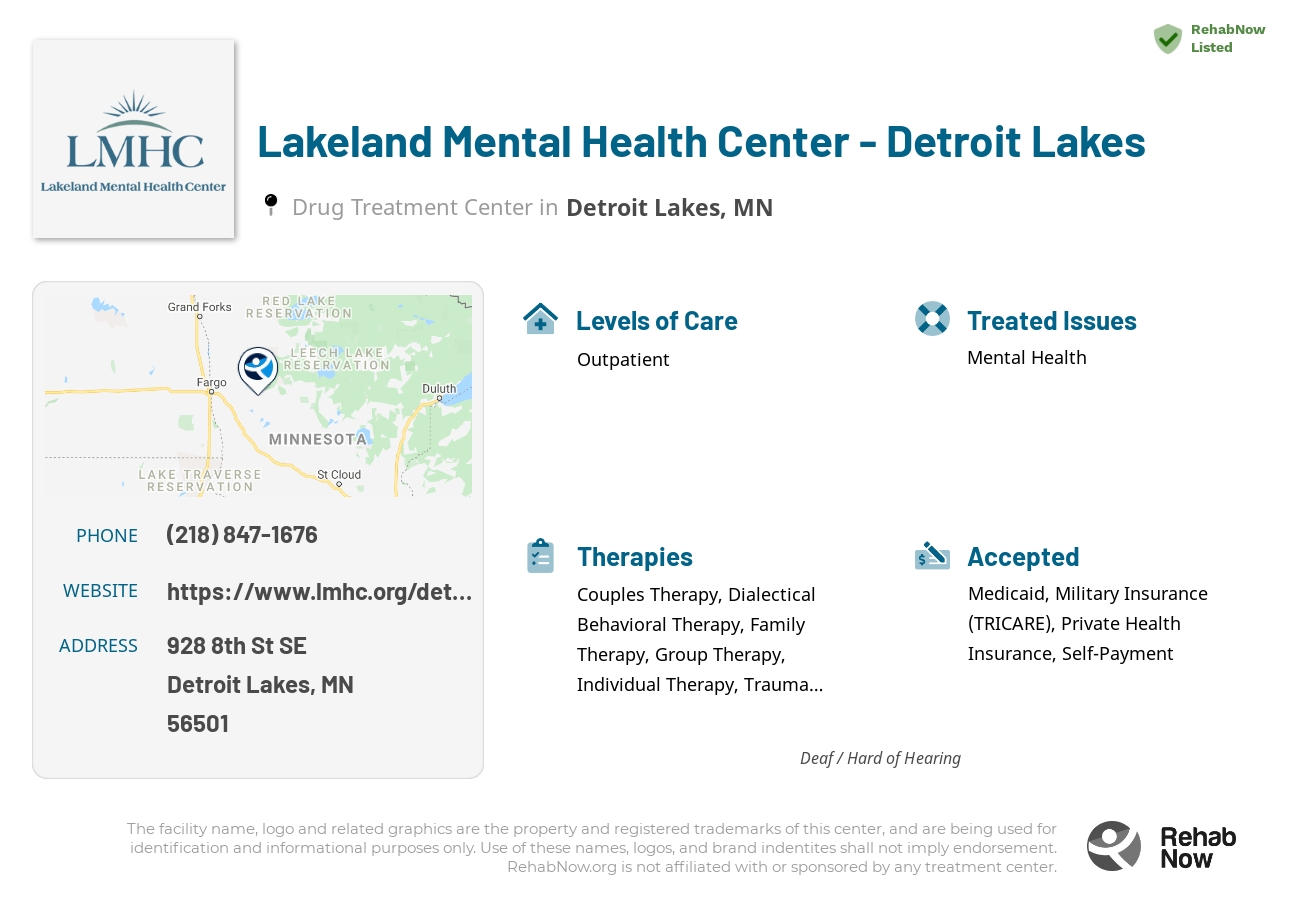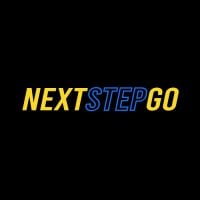Lakeland Mental Health Center - Detroit Lakes
Drug Rehab Center in Detroit Lakes, Minnesota
Lakeland Mental Health Center in Detroit Lakes, Minnesota is a reputable treatment facility offering a wide range of mental health and addiction services, tailored to meet the specific needs of their clients, including dual diagnosis, drug addiction, and alcohol abuse treatments.
About Lakeland Mental Health Center - Detroit Lakes in Minnesota
Lakeland Mental Health Center - Detroit Lakes is one of the oldest and largest treatment facilities in the Detroit Lakes, Minnesota area, established in 1949 as a provider of mental health and addiction services. Their comprehensive care is tailored to the specific needs of their clients, including dual diagnosis, drug addiction, and alcohol abuse treatments. Patients are provided with a variety of levels of care, ranging from intensive outpatient and detox programs to dual-diagnosis options. The center is accredited by CARF and holds a state license, making it a reliable option for those facing mental health and addiction issues.
The services provided by Lakeland Mental Health Center - Detroit Lakes range from individual, group, and family therapy sessions to medication management and recovery education. Patients also benefit from access to peer programs, recreation, and holistic therapies. Furthermore, the center accepts private health insurance plans, making it a financially accessible resource for those in need of addiction treatment. The team of dedicated mental health professionals and addiction counselors at Lakeland Mental Health Center - Detroit Lakes are committed to providing comprehensive, high-quality, person-centered services to help patients achieve lasting recovery.
Genders
Ages
Modality
Additional
Accreditations
State License

CARF
The Commission on Accreditation of Rehabilitation Facilities (CARF) is a non-profit organization that specifically accredits rehab organizations. Founded in 1966, CARF's, mission is to help service providers like rehab facilities maintain high standards of care.
Conditions and Issues Treated
Levels of Care Offered
This center offers a variety of custom treatment tailored to individual recovery. Currently available are Outpatient, with additional therapies available as listed below.
Outpatient treatment can be considered the lowest intensity level of addiction treatment in Detroit Lakes, MN. It is ideal for early phase addiction or lower intensity addictions. Lakeland Mental Health Center - Detroit Lakes peer group support, 12-step programs, and individual counseling are likely to be involved.
Therapies & Programs
Individual therapy is ideal for addicts who want to focus on themselves. It can also be helpful for those whose withdrawal symptoms are exacerbated by the presence of other people.
Benefits of individual therapy are:
- Access to a personalized treatment plan that focuses on the individual needs of the addict
- More privacy during treatment sessions
- Better personal development through introspection
- Increased self-awareness regarding addictive tendencies in order to avoid relapse
- Greater potential for a long-term recovery plan
- Receiving professional advice and detox assistance from medical staff
Couples therapy is a treatment method used to help couples in which at least one member of the couple has a drug addiction. Couples therapy can be used whether the addicted partner is using drugs or in recovery. An additional benefit of couples therapy is that it can help make other types of treatment, such as 12-step programs, more effective.
Family therapy can help you and your family deal with old issues that may trigger substance abuse. The idea behind family therapy for drug addiction is that you are never fully healed from substance abuse until you’ve healed your relationship with your family, too. To get sober, you need to find a different way to cope with the pain in your life.
This is when a group of people in various stages of recovery meet up and discuss their experiences, triggers, successes, failures, and even alternative therapies! Unlike support groups where everyone already knows each other, group therapy is conducted along side outpatient or inpatient treatment at Lakeland Mental Health Center - Detroit Lakes.
Trauma therapy is a clinical process that helps individuals deal with mental stress often caused by traumatic events. The therapist helps the person identify, understand and work through the problem. This is done with the help of talking about it in group or one-on-one counseling sessions.
Therapists use relaxation, role-playing, art, and music to help the person open up about what is bothering them. Some examples include:
- Talking about the traumatic event and how it affected them.
- Helping those who have PTSD to deal with their nightmares and recurring memories.
- Working with individuals to resolve the issues triggering the stress, whether seeing someone who reminds them of what happened or feeling helpless.
The individual is also encouraged to help others that are struggling with similar problems. This often helps them feel empowered and gives them hope.
Trauma therapy is not for everyone; it is usually reserved for people who have recently experienced a traumatic event and struggle to get over it. It is generally done for children, teenage victims of sexual assault, and war veterans.
Dialectical Behavior Therapy (DBT) is used by drug treatment centers across the United States to help drug addicts become sober. DBT is a type of Cognitive Behavioral Therapy (CBT) that combines traditional behavioral treatments with elements from DBT, including dialectics, distress tolerance, and interlocking issues. Some of the negative behaviors associated with addiction, such as impulsivity and mood swings, are addressed in DBT, while others like craving and isolation are not. It is commonly used to treat Borderline Personality Disorder (BPD) along with substance abuse disorders.
The four DBT modules are mindfulness, interpersonal effectiveness, emotion regulation, and distress tolerance:
- Mindfulness helps recovering addicts learn to identify and experience their emotions while realizing that they are not permanent.
- Interpersonal Effectiveness includes assertiveness, asking for what you need, and saying no while improving communication skills.
- Distress Tolerance has recovering addicts learn how to tolerate distress at the moment and avoid resorting to substance abuse.
- Emotion Regulation is used to identify, express and change emotions.
CBT is a psychotherapy approach and method. [ws-nap-name] people to examine how their thoughts, including habitual harmful and inaccurate thinking, affect their actions. CBT is based on the idea that rigid, inflexible thinking leads to poor stress management, which leads to emotional distress.
Similarly, CBT helps people identify and change negative behaviors. It makes you question your perceptions and ask if they are realistic. CBT asks people to examine their behaviors and emotional responses and how they affect their lives. CBT aims to change people’s thinking and behavior to lead a more balanced and healthy life.
Moreover, CBT has been shown to reduce anxiety disorders, depression, and symptoms associated with harmful thoughts or actions.
Payment Options Accepted
For specific insurance or payment methods please contact us.
Is your insurance accepted?
Ask an expert, call (888) 674-0062
Lakeland Mental Health Center Associated Centers
Discover treatment facilities under the same provider.
- Lakeland Mental Health Center - Fergus Falls in Fergus Falls, MN
- Lakeland Mental Health Center - South Moorhead in Moorhead, MN
- Lakeland Mental Health Center - Alexandria in Alexandria, MN
Learn More About Lakeland Mental Health Center Centers
Additional Details
Specifics, location, and helpful extra information.
Detroit Lakes, Minnesota 56501 Phone Number(218) 847-1676 Meta DetailsUpdated November 25, 2023
Staff Verified
Lakeland Mental Health Center - Detroit Lakes Patient Reviews
There are no reviews yet. Be the first one to write one.
Detroit Lakes, Minnesota Addiction Information
Minnesota is fighting an opioid epidemic that is leaving hundreds of its residents dead each year. Both prescription opioids and illicit opioids are widely abused in the Land of 10,000 Lakes. Heroin continues to be one of the most commonly abused drugs in the state, if not the most common illicit drug. Over 10% of all treatment admissions in Minnesota list heroin as their drug of choice.
In Detroit Lakes, Minnesota, the drug addiction problem is not as bad as in other parts of the country, but it is still a problem. According to the National Institute on Drug Abuse, about 9.4% of people in Detroit Lakes, Minnesota, abuse drugs. Finding the right drug rehab center for you or your loved one is important, as not all centers will be the right fit.
Treatment in Nearby Cities
- Little Falls, MN (90.7 mi.)
- Ogema, MN (20.1 mi.)
- Rush City, MN (157.9 mi.)
- Sawyer, MN (152.0 mi.)
- Albert Lea, MN (250.0 mi.)
Centers near Lakeland Mental Health Center - Detroit Lakes
The facility name, logo and brand are the property and registered trademarks of Lakeland Mental Health Center - Detroit Lakes, and are being used for identification and informational purposes only. Use of these names, logos and brands shall not imply endorsement. RehabNow.org is not affiliated with or sponsored by Lakeland Mental Health Center - Detroit Lakes.











